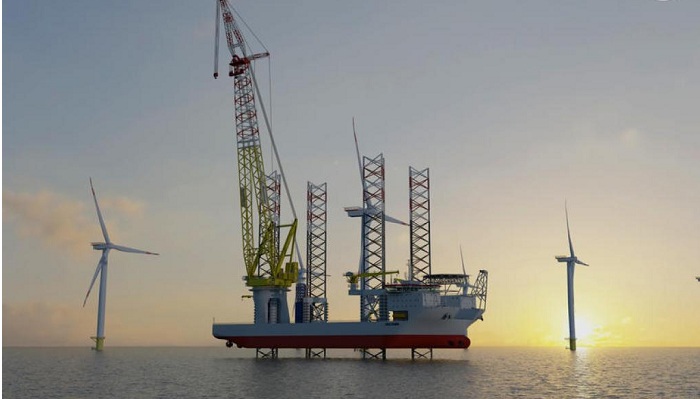Dogger Bank Wind Farm and Jan De Nul Group announce the signing of the final contract for the transport and installation of 87 GE Haliade-X 14 MW offshore wind turbines. Dogger Bank C at up to 200 km off the Yorkshire coast is the third Dogger Bank Wind Farm package awarded to Jan De Nul. Following the signature of packages A and B, this will bring the total WTGs to be installed to an impressive 277 units.
For the delivery and installation of the 14 MW turbines, Jan De Nul Group will mobilise its newest Next Gen Offshore Jack-Up Installation Vessel Voltaire, turning this project into her first assignment. The contract is subject to Dogger Bank C reaching Financial Close in late 2021.
Building the world’s largest offshore wind farm off the English coast
The 3.6 GW Dogger Bank Wind Farm, which is being delivered in the North Sea in three 1.2 GW phases, is set to be the world’s largest offshore wind farm when complete.
The first two phases, Dogger Bank A and B, each feature 95 units of 13 MW turbines. They are a joint venture between Equinor (40%), SSE Renewables (40%) and Eni (20%). The third phase, Dogger Bank C, is being developed on a different timescale and is owned by SSE Renewables (50%) and Equinor (50%).
When complete, Dogger Bank will generate enough energy to power over 6 million UK homes every year.
Dogger Bank Wind Farm secured 3.6 GW of offshore wind contracts in the UK Government’s 2019 contracts for difference auctions. Record low prices were awarded for the three phases making up Dogger Bank Wind Farm: Dogger Bank A, Dogger Bank B and Dogger Bank C. Dogger Bank C is planned to reach financial close by the end of 2021.
SSE Renewables is leading the development and construction phases of Dogger Bank Wind Farm and Equinor will lead on operations for its lifetime of up to 35 years.
Steve Wilson, Dogger Bank Wind Farm’s Project Director at SSE Renewables, said: “Jan De Nul Group has a great track record for the transportation and installation of turbines on scale, and offshore wind farms don’t come any bigger than ours. With a lifting capacity of more than 3,000 tonnes, the ultra-clean Voltaire vessel is set to become the world’s largest jack-up vessel when it enters service in 2022. Securing this state-of-the-art vessel for all three phases of Dogger Bank Wind Farm is another reminder of how we’re working with our suppliers to drive innovation in offshore wind.”
Halfdan Brustad, Vice President for Dogger Bank at Equinor, said: “We are extremely pleased to have secured the Voltaire for the third phase of Dogger Bank, as it will follow the turbine installations for phases A and B. By the time Dogger Bank Wind Farm is complete, this low emissions vessel will have installed 277 of the world’s most powerful turbines at the world’s biggest offshore wind farm; quite a feat for The Voltaire’s first assignment! This continued contract with Jan De Nul demonstrates world class innovation delivering at scale, both important factors in ensuring we build Dogger Bank as efficiently and sustainably as possible.”
Philippe Hutse, Director Offshore Division at Jan De Nul Group, said: “Dogger Bank Wind Farm is exactly the type of project we had in mind when we took the decision to build our Voltaire. The scale and characteristics of the offshore Dogger Bank and turbines offer the perfect challenge for this Next Gen Offshore Jack-Up Installation Vessel. We are proud to be recognised in our choices and look forward to working together with industry leaders SSE Renewables and Equinor on the Dogger Bank C phase of this world-leading project. We are excited to take part in the worldwide transition to renewable energies by installing the offshore wind turbines at Dogger Bank A, B and C in the most efficient and clean manner possible.”
First seaworthy installation vessel to be an Ultra-Low Emission vessel
This Offshore Jack-Up Installation Vessel Voltaire is currently under construction. She will have a lifting capacity of over 3,000 tonnes and will enter into service in 2022.
She is named after the pioneering European Enlightenment philosopher and is fitted with a highly advanced exhaust filtering system by means of a Selective Catalytic Reduction system and a Diesel Particulate Filter, making it the very first seagoing installation vessel of its kind to be an Ultra-Low Emission vessel (ULEv), moreover Stage V-certified.





































